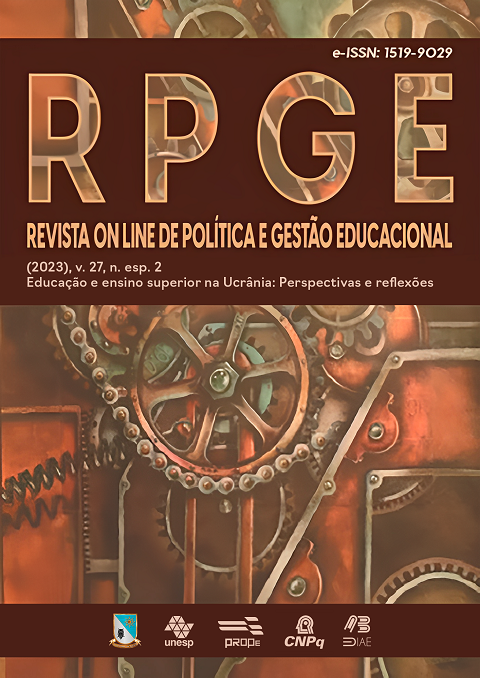Distance learning 2023
Trends, challenges, problems
DOI:
https://doi.org/10.22633/rpge.v27iesp.2.18583Keywords:
Modern education, Digital education, Distance learning tools, Professional training, Higher educationAbstract
This article provides a comprehensive analysis of the latest research in distance education, addressing crucial elements of trends, challenges, and issues associated with remote teaching. It emphasizes the role and relevance of contemporary technologies in enhancing the quality of distant learning. The methodology employed involves the analysis of scientific research. Based on the literature review, technological innovations aimed at improving the learning process are examined. Furthermore, the importance of dynamic interaction between teachers and students in the virtual context is highlighted. The conclusions emphasize the need for future research to enhance distance education and the learning process continuously. The analysis in this article offers profound insights into contemporary challenges and prospects regarding advancing distance education.
Downloads
References
ADANAN, H.; ADANAN, M.; HERAWAN, T. M-WebQuest Development: Reading Comprehension of Senior High School Students in Indonesia. International Journal of Emerging Technologies in Learning (iJET), v. 15, n. 03, p. 74, 18 Feb. 2020. DOI: 10.3991/ijet.v15i03.10628.
ALMAZOVA, N.; BARINOVA, D.; IPATOV, O. Forming of information culture with tools of electronic didactic materials. In: ALMAZOVA, N.; BARINOVA, D.; IPATOV, O. INTERNATIONAL DAAAM SYMPOSIUM, 28., 2018. Proceedings […]. [S. l.]: DAAAM International Vienna, 2018. p. 0587-0593. DOI: 10.2507/29th.daaam.proceedings.085.
ARTHUR-NYARKO, E.; AGYEI, D. D.; ARMAH, J. K. Digitizing distance learning materials: Measuring students’ readiness and intended challenges. Education and Information Technologies, v. 25, n. 4, p. 2987-3002, 15 Jan. 2020. DOI: 10.1007/s10639-019-10060-y.
BAGUZINA, E. Webquests: Fostering Foreign Language Learning in a University Environment. SSRN Electronic Journal, 2020. DOI: 10.2139/ssrn.3552707.
BAKER, D. Mc A.; UNNI, R. USA and Asia Hospitality & Tourism Students' Perceptions and Satisfaction with Online Learning versus Traditional Face-to-Face Instruction. E-Journal of Business Education and Scholarship of Teaching, v.12, n. 2, p. 40-54, 2018.
BRAUN, V.; CLARKE, V. Reflecting on reflexive thematic analysis. Qualitative Research in Sport, Exercise and Health, v. 11, n. 4, p. 589-597, 13 June 2019. DOI: 10.1080/2159676x.2019.1628806.
DANDASHLY, N. A.; BARBAR, A.; ANTOUN, M. The effects of using blogs and webquests in teaching education postgraduate courses. Global Journal of Information Technology: Emerging Technologies, vol. 9, no. 1, p. 12-19, 30 Apr. 2019. DOI: 10.18844/gjit.v9i1.4018.
GÜRGIL, F.; ÜNAL, M.; AKSOY, B. Social Studies Preservice Teachers’ Views on and Experiences with WebQuest. Journal of Education and Training Studies, vol. 7, no. 4, p. 131, 14 Mar. 2019. DOI: 10.11114/jets.v7i4.4061.
HALBERSTADT, J. et al. Skills and knowledge management in higher education: how service learning can contribute to social entrepreneurial competence development. Journal of Knowledge Management, v. 23, n. 10, p. 1925-1948, 9 Dec. 2019. DOI: 10.1108/jkm-12-2018-0744.
KONONETS, N.; ILCHENKO, O.; MOKLIAK, V. Future teachers resource-based learning system: Experience of higher education institutions in Poltava City, Ukraine. Turkish Online Journal of Distance Education, p. 199-220, 1 July 2020. DOI: 10.17718/tojde.762054.
KOSTENKO, L. et al. Distance learning as an integrative response to contemporary challenges. Futurity Education, v. 3, n. 1, p. 151-164, 24 Mar. 2023. DOI: 10.57125/fed/2022.10.11.12.
KULICHENKO, A.; POLYEZHAYEV, Y. Innovative information and communication technologies for ergotherapists applied during english learning in Ukraine. AD ALTA: 10/02, v. 10, n. 2, p. 228-233, 31 Dec. 2020. DOI: 10.33543/1002228233.
LIU, Q.; CHEN, H.; CRABBE, M. J. C. Interactive Study of Multimedia and Virtual Technology in Art Education. International Journal of Emerging Technologies in Learning (iJET), v. 16, n. 01, p. 80, 12 Jan. 2021. DOI: 10.3991/ijet.v16i01.18227.
LUTSENKO, N. S.; SIDELNIK, E. A.; MELNIK, O. G. Webquest in teaching students. In: ALMAZOVA, N. I.; RUBTSOVA, A. V.; BYLIEVA, D. S. (ed.). Professional Сulture of the Specialist of the Future. European Proceedings of Social and Behavioural Sciences. London: Future Academy, 2019. v. 73, p. 618-629. DOI: 10.15405/epsbs.2019.12.66.
PARK, H. H.; FAERMAN, S. Becoming a Manager: Learning the Importance of Emotional and Social Competence in Managerial Transitions. The American Review of Public Administration, v. 49, n. 1, p. 98-115, 3 July 2018. DOI: 10.1177/0275074018785448.
PEARLSTEIN, J. Team formation that models real life: Teaching students to form better teams in the capstone and beyond. Journal of Education for Business, v. 95, n. 6, p. 375-383, 8 Oct. 2019. DOI: 10.1080/08832323.2019.1665488.
PROKOPENKO, O. Technological challenges of our time in the digitalization of the education of the future. Futurity Education, v. 1, n. 2, p. 4-13, 25 Dec. 2021. DOI: 10.57125/fed/2022.10.11.14.
SHERMAN, M. et al. The future of distance education in war or the education of the future (the Ukrainian case study). Futurity Education, v. 2, n. 3, p. 13-22, 25 Sept. 2022. DOI: 10.57125/fed/2022.10.11.30.
TYTOVA, N; MERENIUK, K. Digital literacy of future teachers in the realities of large-scale military aggression (Ukrainian experience). Futurity Education, v. 2, n. 3, p. 43-54, 25 Sept. 2022. DOI: 10.57125/fed/2022.10.11.33.
ZINCHENKO, V.; OSTAPENKO, S.; UDOVICHENKO, H. Introduction of Academic Honesty as a Necessary Prerequisite and an Important Component of Quality Education for Future Economists. Revista Romaneasca pentru Educatie Multidimensionala, vol. 13, no. 1, p. 81-95, 16 Mar. 2021. DOI: 10.18662/rrem/13.1/361.
Published
How to Cite
Issue
Section
License
Copyright (c) 2023 Revista on line de Política e Gestão Educacional

This work is licensed under a Creative Commons Attribution-NonCommercial-ShareAlike 4.0 International License.
Manuscritos aceitos e publicados são de propriedade da Revista on line de Política e Gestão Educacional. É vedada a submissão integral ou parcial do manuscrito a qualquer outro periódico. A responsabilidade do conteúdo dos artigos é exclusiva dos autores. É vedada a tradução para outro idioma sem a autorização escrita do Editor ouvida a Comissão Editorial Científica.











